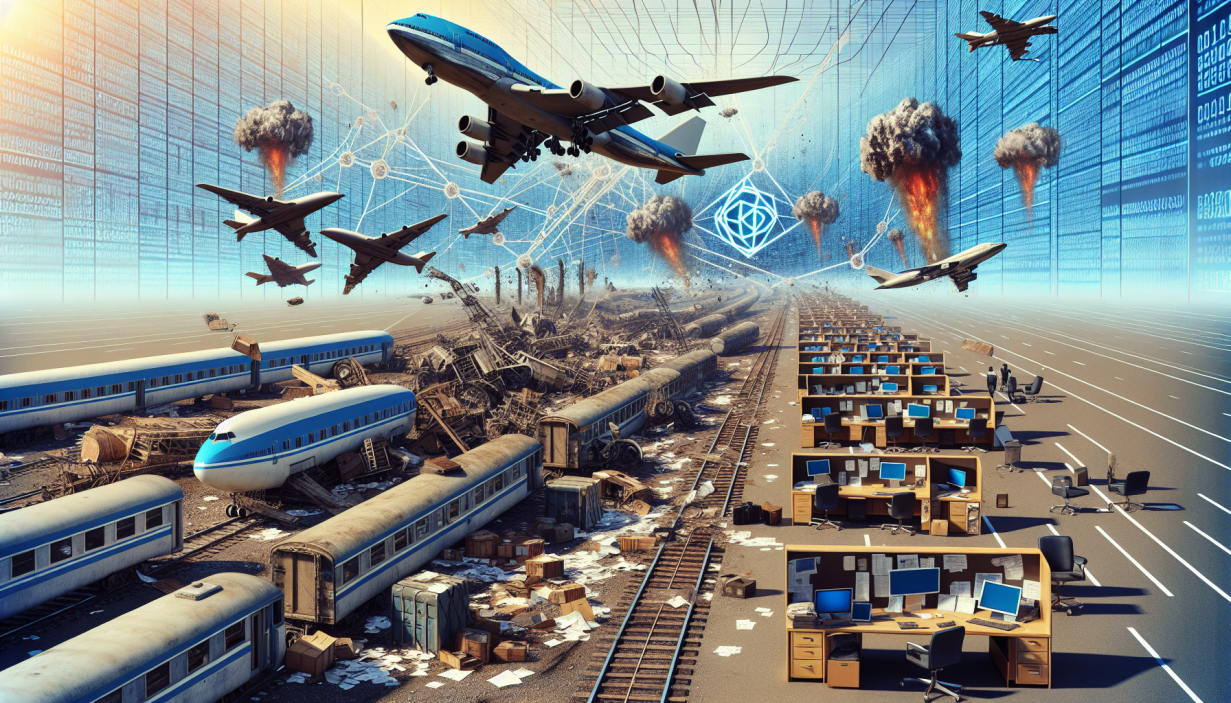Crowdstrike Global Outage Confirms Why Centralization Is Bad
The problem has caused Windows computers to display the Blue Screen of Death (BSOD), disrupting numerous services and businesses worldwide
July 19, 2024 10:52 AM
Reading time: 3 minutes, 27 seconds
TL;DR A widespread technical issue with CrowdStrike's centralized software has led to a global outage affecting various sectors.

Global Outage Caused by CRO WD Strike's Falcon Sensor
A widespread technical issue with CrowdStrike's centralized software has led to a global outage affecting various sectors, including planes, railways, and media. The problem, which emerged on July 19, 2024, has caused Windows computers to display the Blue Screen of Death (BSOD), disrupting numerous services and businesses worldwide.
CrowdStrike, a leading cybersecurity firm, acknowledged the malfunction early Friday. The company attributed the crashes to its Falcon Sensor software, which is designed to protect systems from cyber threats. The company assured users that its engineering teams are actively working to resolve the issue.
The outage has had a domino effect, impacting multiple platforms and businesses worldwide, including Sky News, 911 services in Alaska, Amazon Web Services, Instagram, eBay, and ADT.
Centralized vs. Decentralized Infrastructure
The outage has caused such widespread damage, in part due to CrowdStrike's technology's centralized nature. This approach aims to give organizations comprehensive visibility, consistent policy enforcement, and coordinated threat detection and response across their entire IT infrastructure from a unified platform.
However, decentralized web infrastructure could have significantly mitigated the widespread issues caused by the CrowdStrike Falcon Sensor malfunction, highlighting the vulnerabilities inherent in centralized services.
Leveraging distributed systems and blockchain technology, a decentralized approach would have provided greater resilience, fault tolerance, and security.
Examples of Decentralized Solutions
For instance, if critical systems were built on decentralized platforms like Arweave's permanent storage network or IPFS's distributed file system, the impact of a single point of failure would have been minimized.
These systems distribute data and processing across multiple nodes, ensuring continued operation even if some nodes fail or are compromised. In the case of the CrowdStrike incident, maintaining service continuity through other operational nodes could have prevented the widespread outages.
Moreover, decentralized infrastructure offers enhanced security and integrity. Data in such systems is often cryptographically secured and verified, making it difficult for attackers to alter or corrupt information without detection.
This feature could have protected critical systems from the cascading effects of the Falcon Sensor malfunction, potentially preventing the Blue Screen of Death incidents that disrupted numerous services worldwide.
Arweave's AO Computer as a Solution
Indeed, Arweave's recently launched AO computer could offer a direct, decentralized alternative to centralized security solutions like CrowdStrike's Falcon Sensor. AO's architecture, which relies on a network of decentralized nodes for data storage and processing, ensures resilience and fault tolerance by eliminating single points of failure.
Each node in the AO network could independently analyze system behaviors and network traffic, sharing findings across the network to maintain robust threat detection. By leveraging Arweave's immutable storage, AO could keep a permanent, tamper-proof log of security events, providing continuous access to critical data even during system failures.
Additionally, AO's autonomous agents could independently monitor and respond to threats, ensuring that security measures remain active without reliance on a central server.
This decentralized approach enhances the system's resilience and security. Even if some nodes are compromised, the overall security infrastructure remains operational, preventing widespread disruption in today's incidents.
Impact on Various Sectors
The CrowdStrike outage significantly affected the aviation sector, with major U.S. airlines like American Airlines, Delta Airlines, and United Airlines grounding flights due to communication issues. The Federal Aviation Administration (FAA) has not commented on the situation.
Sky News and other broadcasters have also experienced downtime, highlighting the widespread impact of the outage, according to Sky News.
In the United Kingdom, the disruption has affected banks, airlines, and media companies, including the London Stock Exchange.
Similar issues have been reported in Australia, where banks, supermarkets, and broadcasters like the Australian Broadcasting Corporation faced operational challenges.
Australia's national cyber security coordinator confirmed that the outage, which affected multiple companies and services across the country, stemmed from a third-party software glitch, as detailed by The Guardian.
"By reducing reliance on centralized control points, decentralized systems also mitigate the risk of large-scale failures from a single software update or configuration change, thus providing a more robust and resilient infrastructure for essential services."
Microsoft has also been involved in addressing the fallout from the outage, taking "mitigation actions" to resolve service issues impacting its cloud services and applications.



